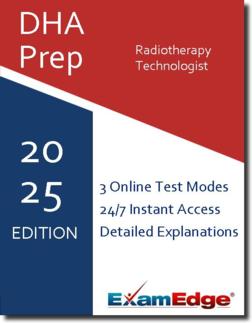DHA Radiotherapy Technologist (DHA-RAD) Practice Exams & Test Prep - Test Reviews
Based on 40 Reviews
- Real Exam Simulation: Timed questions and matching content build comfort for your DHA Radiotherapy Technologist test day.
- Instant, 24/7 Access: Web-based DHA Radiotherapy Technologist practice exams with no software needed.
- Clear Explanations: Step-by-step answers and explanations for your DHA exam to strengthen understanding.
- Boosted Confidence: Reduces anxiety and improves test-taking skills to ace your DHA Radiotherapy Technologist (DHA-RAD).

DHA Radiotherapy Technologist (DHA-RAD) Practice Exams & Test Prep - Review
DHA Radiotherapy Technologist - Reviews
Excellent
Based on
200
reviews
“ Hi Ma'am, thank you so much. I cleared my DHA exam, and this time the question papers helped me a lot. I will surely recommend DHA prep to all my friends. Thanks once again.
Shafana ,
“ Very helpful and quick response.
Roxan , United Kingdom
See why our users from 154 countries love us for their exam prep! Including 40 reviews for the DHA Radiotherapy Technologist exam.
Exam Edge is an Industry Leader in Online Test Prep. We work with our Institutional Partners to offer a wide array of practice tests that will help you prepare for your big exam. No Matter how niche field of interest might be, were here to help you prepare for your test day.
| 2.8M | 4.5M | |
| Users | Tests Taken | |
| 100K | 19 | |
| Unique Exams | Years in Business | |


